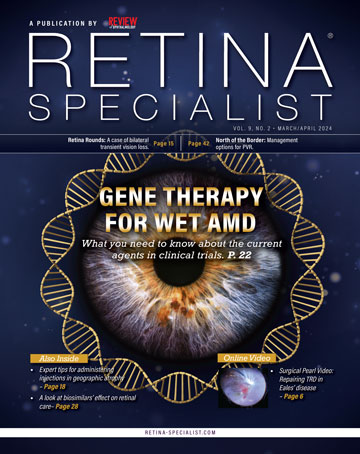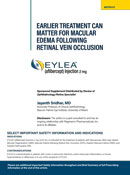We often see confusion on our clients’ faces when we talk to them about the appropriate use of post-surgical modifiers. In this article, I discuss the modifiers necessary when billing additional surgical procedures during the global period of another procedure. Three modifiers in particular affect a surgical retina practice’s proper coding and reimbursement within the global period of another surgical procedure. The Current Procedural Terminology (CPT) manual describes the three modifiers I’m going to review:
–58: Staged or related procedure or service by the same physician or other qualified health care professional during the postoperative period.
–78: Unplanned return to the operating/procedure room by the same physician or other qualified health care professional following initial procedure for a related procedure during the postoperative period.
–79: Unrelated procedure or service by the same physician or other qualified health care professional during the postoperative period.
Modifier –58
Misunderstanding is common when deciding how and when to use –58. Three scenarios in the Medicare Claims Processing Manual (MCPM) apply to this modifier:
Modifier “-58” was established to facilitate billing of staged or related surgical procedures done during the postoperative period of the first procedure.
The physician may need to indicate that the performance of a procedure or service during the postoperative period was:
a. Planned prospectively or at the time of the original procedure;
b. More extensive than the original procedure; or
c. For therapy following a diagnostic surgical procedure.
These circumstances may be reported by adding modifier “–58” to the staged procedure. A new postoperative period begins when the next procedure in the series is billed.1
Items a and b represent the most common usage for –58. Item a illustrates a “staged” scenario—a procedure that follows another procedure and is pre-planned when the decision for the primary procedure was made. In other words, the surgeon anticipates needing the second procedure before performing the first. “More extensive” in item b does not require pre-planning. From the payer’s perspective, “More extensive” represents increased value or a greater reimbursement. The second procedure during the global period is “more extensive” when it has a greater reimbursement.
An example of a staged procedure is a vitrectomy internal limiting membrane peel for diabetic macular edema (DME) (CPT 67042) followed by a sequence of pre-planned intravitreal injections (CPT 67028) of anti-VEGF to treat the DME in the same eye. It is obvious that this does not represent “more extensive” in terms of value, but the injections are clearly pre-planned. If the injections were not pre-planned, the payer would likely view the subsequent injections as postoperative care, reimbursing only the drug.
“More extensive” is easier to understand, but is often misinterpreted. A classic scenario is a retinal detachment (RD) repair (CPT 67108) followed by a complex RD repair involving proliferative vitreoretinopathy (PVR) and membrane peeling (CPT 67113) in the same eye. In this case, the second RD repair was not pre-planned but it was “more extensive” and coded with –58. We often see practices erroneously code this scenario with –78. A second example would be laser treatment of a retinal tear (CPT 67145). Within the 90-day global period, the tear progresses to an RD, requiring vitrectomy RD repair (CPT 67108). In this case, “more extensive” also applies.
Modifier –58 reimburses the surgeon based on 100 percent of the allowed amount and restarts the global period (as long as it exceeds the first global period). In the first scenario—injection following the vitrectomy—the global period would continue running from the vitrectomy, but in the second scenario a new 90-day clock commences.
Modifier –78
Billers sometimes use this modifier erroneously when –58 is the correct choice. The MCPM describes –78 as:
When this subsequent procedure is related to the first procedure and requires the use of the operating room, this circumstance may be reported by adding the modifier “–78” to the related procedure.2
Medicare and other third-party payers do not typically pay for treatment of complications during a global period. However, when treating the complication requires a return to the operating room, they cover the related care. For example, a patient who underwent a vitrectomy RD repair (CPT 67108) unexpectedly develops endophthalmitis within the first week. The surgeon returns to the operating room to perform a vitrectomy (CPT 67036). The second vitrectomy is treating a related and/or complication of the first procedure by returning to the OR. The second vitrectomy is not “more extensive” or “staged” therefore –78 applies.
Modifier –78 reimburses the surgeon approximately 80 percent of the allowed amount, depending on the payer, but it does not restart the global period. The global period continues to run from the first procedure.
Modifier –79
Considering the three modifiers discussed, –79 is the easiest to use and simplest to understand. The MCPM describes –79 as follows:
Modifier “–79”: Reports an unrelated procedure by the same physician during a postoperative period. The physician may need to indicate that the performance of a procedure or service during a postoperative period was unrelated to the original procedure.3
The classic illustration is a procedure on the fellow eye during the global period of a procedure on the primary eye. For example, a patient with diabetic retinopathy and DME needs focal laser in both eyes. The right eye is treated with CPT 67210; followed 10 days later by focal laser to the left eye (CPT 67210). Modifier –79 appended to the second treatment facilitates payment of an unrelated service.
Modifier –79 reimburses the surgeon based on 100 percent of the allowed amount and restarts the global period (as long as it exceeds the first global period). In this scenario, a new 90-day global period begins following the second laser.
Conclusion
These three surgical modifiers are important to a retina practice that does any amount of surgery. Differentiating between –58 and –78 can be challenging, but know that if –58 applies, use it. Watch the global periods closely as modifier –78 does not restart the global period, but –58 and –79 do. RS
Mr. Mack is a senior consultant with Corcoran Consulting Group. He can be reached at 1-800-399-6565 or at www.corcoranccg.com.
REFERENCES
1. Center for Medicare and Medicaid Services. Medicare Claims Processing Manual (MCPM). Chapter 12§40.2 (A)(6). Staged or Related Procedures. https://www.cms.gov/Regulations-and-Guidance/Guidance/Manuals/downloads/clm104c12.pdf. Updated April 14, 2017. Accessed August 7, 2017.
2. Center for Medicare and Medicaid Services. Medicare Claims Processing Manual (MCPM) Chapter 12§40.2 (A)(5). Return Trips to the Operating Room During the Postoperative Period. https://www.cms.gov/Regulations-and-Guidance/Guidance/Manuals/downloads/clm104c12.pdf. Updated April 14, 2017. Accessed August 7, 2017.
3. Center for Medicare and Medicaid Services. Medicare Claims Processing Manual (MCPM) Chapter 12§40.2 (A)(7). Unrelated procedures of Visits during the Postoperative Period. https://www.cms.gov/Regulations-and-Guidance/Guidance/Manuals/downloads/clm104c12.pdf. Updated April 14, 2017. Accessed August 7, 2017.



